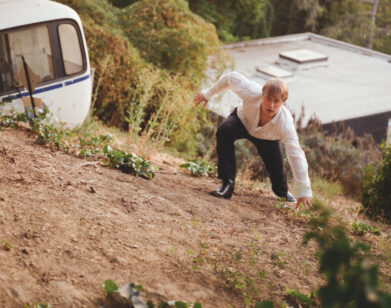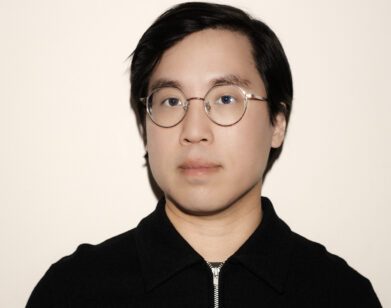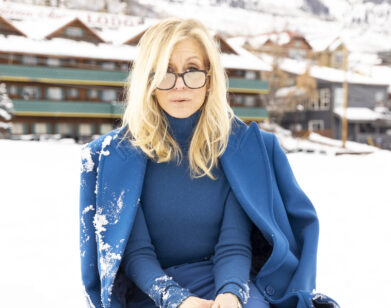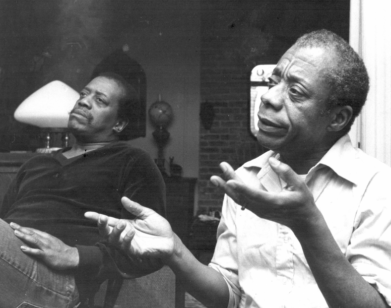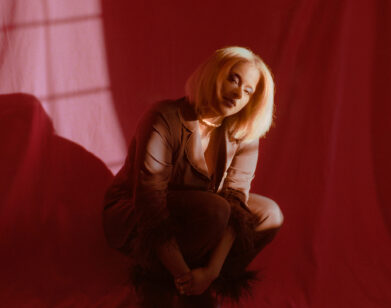rough draft
The Vigorous Vulnerability of Robert Jones, Jr.’s Debut Novel The Prophets
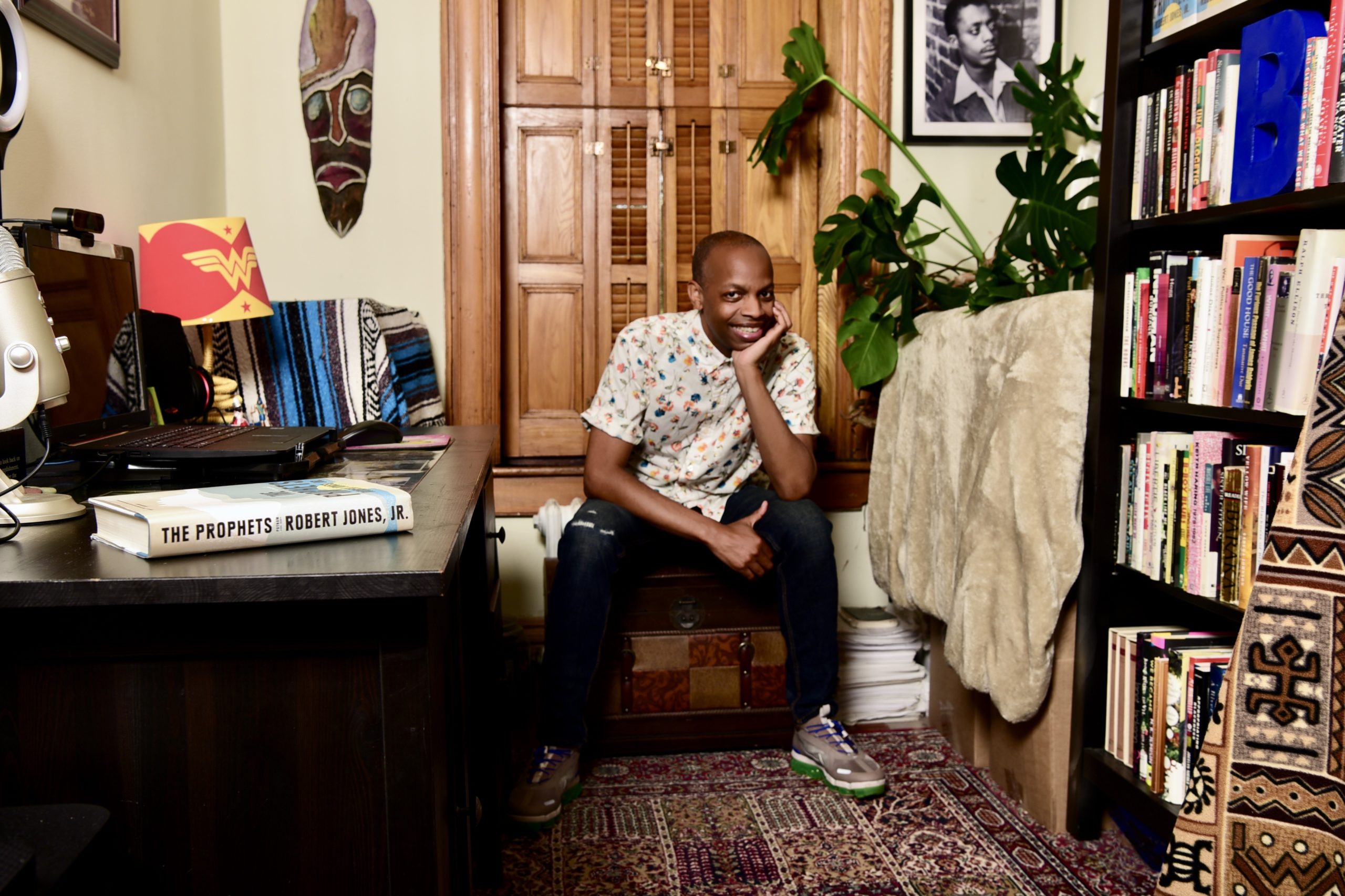
Photos by D’Ambrose Boyd.
This is Rough Draft, in which our favorite writers get to the bottom of their own craft. From preferred writing drinks to whether or not you really need to carry a notebook, we find out all the ways they beat writer’s block and get it done.
In this edition, we speak to Robert Jones, Jr. on the occasion of his dazzling debut The Prophets, a haunting and beautiful historical novel about Black queer love and the dangerous repercussions of claiming and relishing in that love. The novel, which was recently shortlisted (as of this morning!) for the prestigious National Book Award for fiction, tells the heart wrenching story of two enslaved men—Isaiah and Samuel—who fall in love on a Mississippi plantation in the Antebellum South. Below, Jones reflects on the importance of writing the truth, reads to us from his notebook, and tells us what’s on his writing playlist (Janet Jackson and Lil Nas X, to name a couple).
———
JULIANA UKIOMOGBE: Congratulations on being shortlisted for the National Book Award! Where were you when you heard the news?
ROBERT JONES, JR: Thank you so much. I’m still in something of a daze. When the news came in, my husband and I were preparing to leave our home in Brooklyn for the amazing Provincetown Book Festival in Massachusetts. My phone started buzzing. My agent, publicist, and editor all called me at the same time. Family members and friends started calling and texting me, including my sister-friend and fellow longlister Honorée Fanone Jeffers. The National Book Foundation’s Twitter account tagged me in the announcement. I was in a state of utter disbelief, about to leave for this road trip and trying to pull myself together. I was in this loop of shouting, “Have mercy!” and “Thank you so much!”
UKIOMOGBE: The Prophets is said to “blend the lyricism of Toni Morrison with the vivid prose of Zora Neale Hurston.” Do those two writers inform your current work ?
JONES: Yes. Black women writers have had the most profound impact on my own writing. Theirs is the writing I connect with most because of the ways in which they deal with truths about the self and the world. Toni Morrison, Zora Neale Hurston, Alice Walker, Gloria Naylor, Gayl Jones, Octavia Butler, Edwidge Danticat, Kola Boof, and Ayana Mathis are some of the writers who have, in many ways, made it possible for me to write.
UKIOMOGBE: What were you hoping to achieve in writing The Prophets? What gaps were you trying to fill?
JONES: I was hoping to counter a pernicious lie about the nature of queerness/transness in Black people with the truth. It is often said, and carelessly repeated, that the reason Black people are queer is because slavery shattered our sense of righteousness and perverted us. The truth is that what we now call queerness/transness is as natural to human existence as breathing air, and Black queer/trans human beings have existed for as long as human beings have existed. What is, in fact, unnatural—and imposed by colonizing powers—is anti-queerness/anti-transness. I believed that if I wrote about this, not only could the truth be known, but I could give voice to the many real-life Black queer/trans people who have been erased, overlooked, or ignored in the cultural narrative.
UKIOMOGBE: What’s your ideal writing atmosphere? What gets you in the mood?
JONES: Above all, I need quiet. That’s probably why I find writing during the magic hour— three o’clock in the morning— to be optimal. Conversely, I also like writing while riding New York City public transit, and it doesn’t get noisier than that. Maybe it’s something about being surrounded by so many different people from so many different walks of life with so many different energies that inspires me. In terms of what gets me in the mood, I feel inspired to write when I witness or experience great joy or great sorrow.
UKIOMOGBE: What are your go-to writing snacks?
JONES: My snack choices are pretty boring. I like fruit, and I can’t resist a good, crunchy pickle.
UKIOMOGBE: Do you keep a notebook or journal?
JONES: I don’t journal, but sometimes my personal essays double as journal entries. I do have a notebook with me at all times, and I keep it by my bed because sometimes I receive a thought while I’m dreaming, and I have to write it down immediately so I don’t lose it forever.
UKIOMOGBE: Can you open up to a random page of your notebook and read us a line from it?
JONES: “Liberation! Hope! Racism is so predictable.”
UKIOMOGBE: Do you prefer handwriting or typing?
JONES: I prefer handwriting because the flow from the ether, to my head, to my hand feels so natural. I’ve recently started writing in my notes app, although you should see the typos. Atrocious!
UKIOMOGBE: What’s your favorite quote?
JONES: “Incontestably, alas, most people are not, in action, worth very much; and yet, every human being is an unprecedented miracle. One tries to treat them as the miracles they are, while trying to protect oneself against the disasters they’ve become.” ― James Baldwin, No Name in the Street
UKIOMOGBE: Who’s on your writing playlist?
JONES: Janet Jackson, of course. Brandy. Tweet. Missy Elliott. Sade. Normani. Lil Nas X. Gladys Knight and the Pips. Stevie Wonder. Luther Vandross. Jeffrey Osborne. Ari Lennox. Ashford and Simpson. Amel Larrieux. Nas. Lauryn Hill. Stephanie Mills. Tinashe. Herbie Hancock. Robert Glasper.
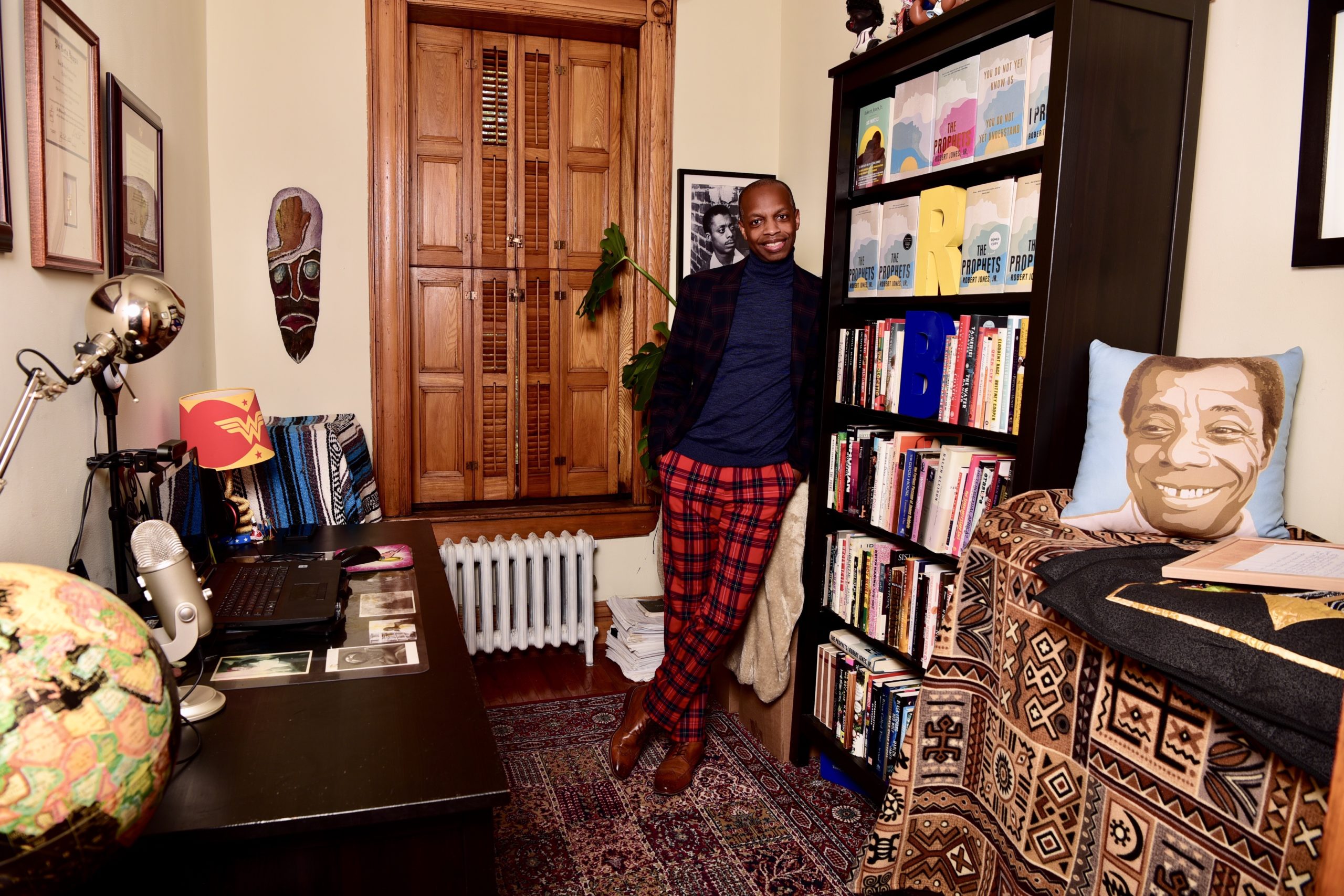
UKIOMOGBE: What’s your favorite book to reread?
JONES: Toni Morrison’s Paradise. I find some new technique or revelation every time I return to it. It’s virtuosic.
UKIOMOGBE: How many drafts of one piece do you typically write?
JONES: Countless drafts. I usually write and rewrite over and over again until someone else—friend, editor, employer—tells me that it’s okay to let go of it.
UKIOMOGBE: Who’s your favorite screenwriter?
JONES: Radha Blank. She did a phenomenal job with The Forty-Year-Old Version. That’s some top-notch writing there. It made me laugh out loud and cry like a baby. It took my breath away. Phew!
UKIOMOGBE: Do you consider writing to be a spiritual practice?
JONES: Absolutely. It requires the same presence of mind, attention to one’s own interior world, mindfulness of one’s thoughts and actions, the same reverence and duty.
UKIOMOGBE: Which writers would you choose to have dinner with, living or dead?
JONES: All living: Gayl Jones, Alice Walker, Edwidge Danticat, Ayana Mathis, Kiese Laymon, De’Shawn Charles Winslow, Maurice Carlos Ruffin, Deesha Philyaw, Honorée Fanone Jeffers, Mateo Askaripour, Dawnie Walton, Cleyvis Natera, Danté Stewart, Marlon James, Alexander Chee, Isaac Fitzgerald, Reginald Dwayne Betts, Brian Broome, Kiley Reid, Cathy Park Hong, Chloe Benjamin, Min Jin Lee, and so many others that I’ve neglected to name.
UKIOMOGBE: What advice do you have for people who want to be better writers?
JONES: It seems to me that the best writers are the ones who can be honest about themselves and the world around them. Honesty, I think, challenges you and eventually elevates your craft. And I’m not talking about the self-flattering kind of honesty, where you’re only ever the hero in your own story. I’m talking about the kind that reveals you with the same rigor and vigor that it reveals others. That kind of vulnerability? I think it makes masterful writers.
UKIOMOGBE: What are some unconventional techniques you stand by?
JONES: I really like when narration recognizes its own errors and corrects them mid-story. I don’t find that to be “unreliable.” I like the willingness to say “I can’t and don’t know everything, but I’ll tell you what I can and do know, and leave the rest up to you, dear reader.”
UKIOMOGBE: Can great writing save the world?
JONES: I’m not sure. If it could, then Octavia Butler would have been heeded and we wouldn’t be suffering through catastrophic climate change, among other things. However, I do believe that great writing can certainly encourage the world to self-reflect. Maybe it can save itself.


